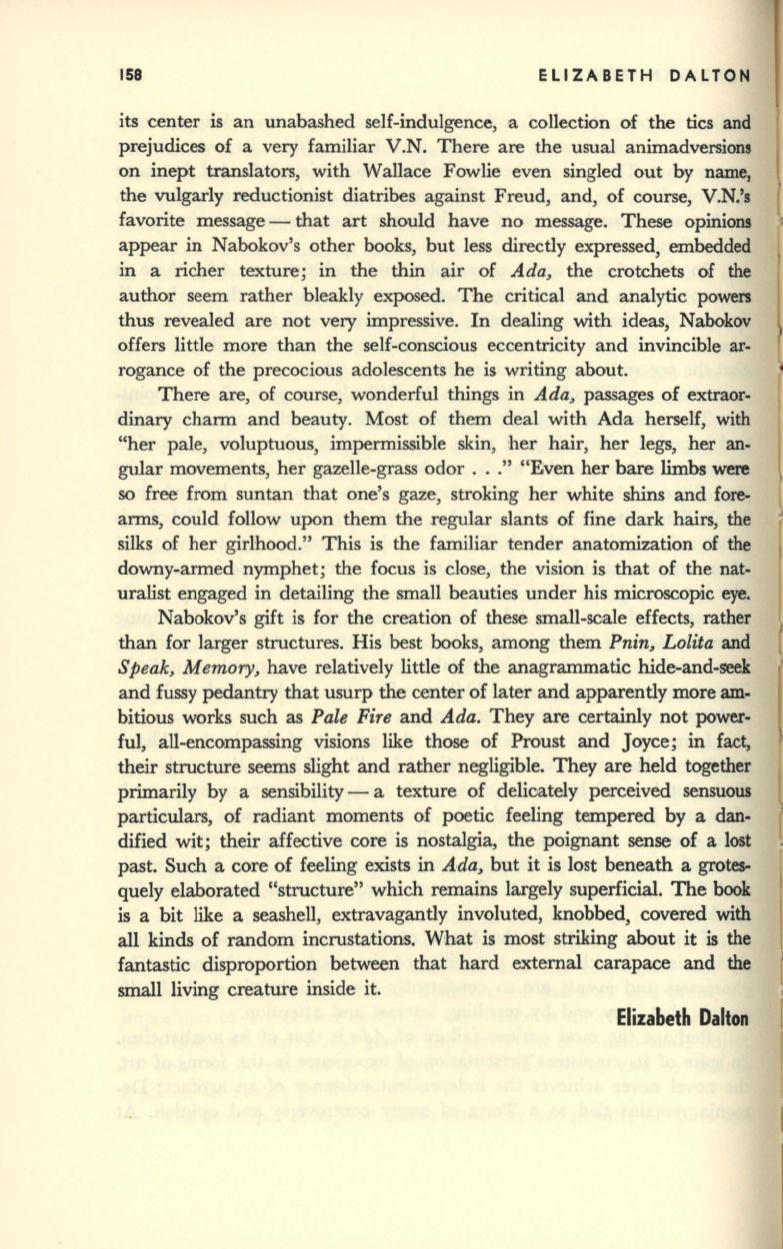
158
ELIZABETH DALTON
its center is an unabashed self-indulgence, a collection of the tics and
prejudices of a very familiar V.N. There are the usual animadversions
on inept translators, with Wallace Fowlie even singled out by name,
the vulgarly reductionist diatribes against Freud, and, of course, V.N.'!
favorite message - that art should have no message. These opinions
appear in Nabokov's other books, but less directly expressed, embedded
in a richer texture;
in
the thin air of
Ada,
the crotchets of the
author seem rather bleakly exposed. The critical and analytic powers
thus revealed are not very impressive. In dealing with ideas, Nabokov
offers little more than the self-conscious eccentricity and invincible ar–
rogance of the precocious adolescents he is writing about.
There are, of course, wonderful things in
Ada,
passages of extraor–
dinary charm and beauty. Most of them deal with Ada herself, with
"her pale, voluptuous, impermissible skin, her hair, her legs, her an–
gular movements, her gazelle-grass odor ..." "Even her bare
limbs
were
so free from suntan that one's gaze, stroking her white shins and fore–
arms, could follow upon them the regular slants of fine dark hairs, the
silks of her girlhood." This is the familiar tender anatomization of
the
downy-armed nymphet; the focus is close, the vision is that of the nat–
uralist engaged in detailing the small beauties under his microscopic eye.
Nabokov's gift is for the creation of these small-scale effects, rather
than for larger structures. His best books, among them
Pnin, Lolita
and
Speak, Memory,
have relatively little of the anagrammatic hide-and-seek
and fussy pedantry that usurp the center of later and apparently more am–
bitious works such as
Pale Fire
and
Ada.
They are certainly not power–
ful, all-encompassing visions like those of Proust and Joyce; in fact,
their structure seems slight and rather negligible. They are held together
primarily by a sensibility - a texture of delioately perceived sensuow
particulars, of radiant moments of poetic feeling tempered by a
dan–
dified wit; their affective core
is
nostalgia, the poignant sense of a lost
past. Such a core of feeling exists in
Ada,
but it is lost beneath a
grotes–
quely elaborated "structure" which remains largely superficial. The book
is a bit like a seashell, extravagantly involuted, knobbed, covered with
all kinds of random incrustations. What is most striking about it
is
the
fantastic disproportion between that hard external carapace and
the
small living creature inside it.
Elizabeth Dalton


